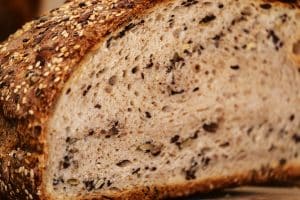 It doesn’t matter where you get your nutritional information, grains are always part of a healthy diet. What makes grains unhealthy is how they’re processed. There are compelling reasons that grains without proper processing can cause a world of woe for your digestive system. If the grains are highly processed, they’re nothing more than empty calories. Some people have problems with gluten in certain grains. That can also cause gluten intolerance or celiac disease. Grains are vital for heart health and help prevent stroke, chronic inflammation, and diabetes, but eating the wrong type can contribute to those problems.
It doesn’t matter where you get your nutritional information, grains are always part of a healthy diet. What makes grains unhealthy is how they’re processed. There are compelling reasons that grains without proper processing can cause a world of woe for your digestive system. If the grains are highly processed, they’re nothing more than empty calories. Some people have problems with gluten in certain grains. That can also cause gluten intolerance or celiac disease. Grains are vital for heart health and help prevent stroke, chronic inflammation, and diabetes, but eating the wrong type can contribute to those problems.
Grains are seeds and Mother Nature has ways to protect them.
Reproducing the species is a driving force of any living entity, whether it’s plants or animals. Each type of plant has a way that ensures seeds are spread far and wide and they only sprout when conditions are prime. One way seeds ensure this is the method of spreading the seed and precautions taken. Animals and birds eat grain seeds. Their hard shell protects them from digestive juices, allowing animals to excrete them in another area, complete with fertilizer. If conditions aren’t right, the enzyme inhibitor in the seed prevents it from sprouting. The enzyme inhibitors also affect the body by blocking digestive enzymes, which slows or stops digestion.
Grains contain phytic acid, lectins, and complex proteins.
Grains contain lectins which are natural insecticides to protect the infant plant from insects. It can cause digestive issues. They also contain phytic acid, which is an anti-nutrient that blocks the absorption of phosphorus, calcium, zinc, and magnesium. Grains also contain complex proteins that are harder to digest. They can cause glycation that leads to AGEs—Advanced Glycation End Products. AGEs can cause several health issues, including chronic inflammation and diabetes.
It’s all about how they’re processed.
Whole grains are better than processed grains. Whole grains contain bran, the germ, and the endosperm. When it’s highly processed, the healthiest parts, the bran and germ, are removed, leaving only the endosperm. The endosperm lacks nutrients and is primarily starch. Whole grains are more nutritious but not necessarily the healthiest option. The grain should be soaked, sprouted, or fermented before grinding to eliminate phytic acid, lectins, and enzyme inhibitors.
- Using heirloom varieties of grain or pseudo-grains can also help reduce or eliminate gluten intolerance or celiac disease. Heirloom wheat varieties contain far less gluten than the commercial wheat used today.
- Enzyme inhibitors protect the seeds to such a point that thousands of years old seeds found in pyramids still sprouted when planted and watered.
- One type of processing that also affects the benefits of grains is bleaching and additives to increase shelf life. The empty calories of the highly processed grain combined with any added sugar can create food with few benefits and many detriments.
- Not all types of grains create issues. If you have problems with modern wheat, consider sorghum, millet, amaranth, oatmeal, brown rice, kamut, or barley.
For more information, contact us today at Iron Fit San Antonio
